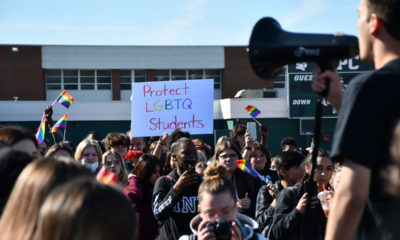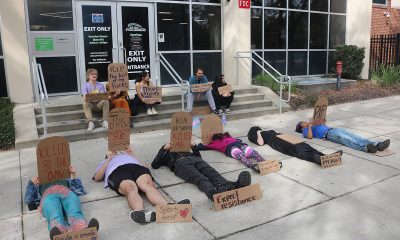National
Romney’s veep options, from bad to worse
Five potential candidates have records hostile to LGBT rights
Amid the media frenzy over who Republican presidential candidate Mitt Romney will select as his running mate, one thing is clear: the leading candidates’ positions on LGBT issues range from bad to downright hostile.
The Washington Blade examined the records of five prospective vice presidential candidates to see where they stand on LGBT issues: former Minnesota Gov. Tim Pawlenty, U.S. Sen. Rob Portman (R-Ohio), U.S. Sen. Marco Rubio (R-Fla.), U.S. Rep. Paul Ryan (R-Wis.) and Louisiana Gov. Bobby Jindal. Each of the potential choices has views on LGBT rights similar to Romney’s, who says he opposes marriage rights for gay couples, but also opposes discrimination — without backing any particular measure to protect LGBT people from discrimination.
One pick that is receiving considerable media attention is Pawlenty, who was a Republican presidential contender early on before he dropped out of the race after his poor showing in the Iowa Ames straw poll. There is media speculation that he tops the list for running mates being vetted by the Romney campaign, although Sunday on CBS’ “Face the Nation” he dismissed the rumors, saying he’s “encouraged people who asked this question in the campaign to look at other prospects.”
Pawlenty took a hardline on marriage over the course of his presidential campaign, signing — albeit belatedly — an anti-gay pledge from the National Organization for Marriage to back a Federal Marriage Amendment, defend the Defense of Marriage Act in court and establish a presidential commission on “religious liberty” to investigate the alleged harassment of opponents of same-sex marriage.
“I don’t think all domestic relationships are the same as traditional marriage,” Pawlenty said on CNN in July. “Marriage between a man and a woman is something that should remain elevated socially, culturally, and practically, legally, morally in our society.”
Another possibility for Romney who is receiving considerable attention is Portman, who’s served for two decades as a public official as a member of Congress, the U.S. Trade Representative and director of the Office of Management & Budget. On Tuesday, Portman appeared to be cozying up to Romney, telling the Washington Reuters Summit the candidate would be “willing to risk being a one-term president in order to make the tough decisions that are going to be required.”
The Ohio senator made headlines when he suggested that he opposes the Employment Non-Discrimination Act, after telling ThinkProgress that he has concerns about litigation that could follow if the legislation were passed.
“What I’m concerned about in Paycheck Fairness and other legislation like that is the fact that it will spawn a lot of litigation the way the legislation is written,” Portman said. “So you don’t want it to be a boon to lawyers, you want it to actually help people. But no one should discriminate.”
Tico Almeida, president of Freedom to Work, said the perception that Portman is opposed to ENDA is inconsistent with what he’s heard based on meetings with the senator’s staff and said Portman — along with “a significant number” of Republican senators — may vote “yes” on the bill.
“Based on Freedom to Work’s conversations with the office of Sen. Portman, we believe he might vote ‘yes’ on ENDA if Sen. Harry Reid brings it to the floor of the Senate for a vote,” Almeida said. “The only way to know for sure is for Reid to fulfill a promise he made three years ago by finally bringing ENDA to the Senate floor.”
Portman’s office didn’t immediately respond to a request to clarify the senator’s position on ENDA. Any such vote in favor of ENDA would represent a change of heart for Portman based on his anti-gay votes while serving as a member of the U.S. House from 1993 to 2005. Portman voted in favor of the Defense of Marriage Act and the Federal Marriage Amendment. In 1999, Portman voted in favor of barring D.C. same-sex couples from adopting children.
Chris Seelbach, a gay Cincinnati City Council member, said he doubts Portman would support LGBT issues if he were elected as vice president based on those votes.
“Based on Sen. Portman’s consistent votes against LGBT families, it seems very clear that he would be no friend to the gay community if elected vice president,” Seelbach said.
Romney is expected to name his running mate prior to the Republican National Convention, which will take place this year during the week of Aug. 27 in Tampa, Fla. Andrea Saul, a Romney campaign spokesperson, declined to comment on any possible selection saying, “We don’t discuss the VP process, sorry.”
The No. 2 person on the Republican presidential ticket could have bearing on how gay Americans who lean conservative may vote in November. Christian Berle, deputy executive director of the Log Cabin Republicans, said the selection will impact whether the organization endorses Romney this fall.
“As Log Cabin Republicans considers many factors in making a potential endorsement, we’ll of course take into account whom will be in such a critical position,” Berle said. “If Gov. Romney and Republicans want to be successful in November, they must improve their position among moderates, women and younger voters with a message entirely focused around jobs and the economy.”
It’s for this reason that Berle praised Ryan, who was among the 159 Republicans who voted for a gay-only version of the Employment Non-Discrimination Act when it came to the House floor in 2007. Ryan later said he took criticism for his vote, but acknowledged he has gay friends, saying, “They didn’t roll out of bed one morning and choose to be gay. That’s who they are.”
Berle said Ryan’s vote for the non-inclusive ENDA in 2007 demonstrates that he recognizes “like all Americans that the workplace needs to be about meritocracy and productivity.”
But besides this vote, Ryan’s record on LGBT issues has hardly been stellar. Ryan voted in the subsequent Congress against hate crimes protection legislation and “Don’t Ask, Don’t Tell” repeal. The lawmaker also expressed opposition to same-sex marriage, saying on NBC’s “Meet the Press” last year, “I support the Wisconsin Amendment to define marriage between a man and a woman.”
Katie Belanger, executive director of Fair Wisconsin, dismissed the notion that a Vice President Ryan would be a champion for LGBT equality upon taking the oath of office.
“Rep. Ryan has maintained a consistently anti-fairness voting record on issues of importance to our community, during the last five congressional sessions, including voting in 2002 against a policy that members of Congress voluntarily adopted to prohibit discrimination based on sexual orientation in their own congressional offices,” she said.
Many pundits have speculated that Rubio is on the list of names Romney is considering for his running mate. Romney said earlier this month the senator was being “thoroughly vetted” for a position as No. 2 on his ticket.
New to federal office, Rubio hasn’t been called on to vote on LGBT issues yet, although he’s been closely aligned with the conservative Tea Party movement. Among his “no” votes were against an LGBT-inclusive reauthorization of the Violence Against Women Act.
Rubio has expressed differing views from Romney on the Federal Marriage Amendment, saying “ultimately marriage is regulated by states,” but has expressed opposition to same-sex marriage based on his religious beliefs.
“I believe marriage is a unique and specific institution that is the result of thousands of years of wisdom, which concluded that the ideal — not the only way but certainly the ideal — situation to raise children to become productive and healthy humans is in a home with a father and mother married to each other,” Rubio said.
Nadine Smith, executive director of Equality Florida, said the LGBT community wouldn’t be able to trust Rubio if he were vice president during a Romney administration.
“I don’t think he believes the foolishness he says, he’s pandering as fast as he can, and in that sense, he and Romney are made for each other,” Smith said. “They’re both weather vanes.”
Another potential running mate is Jindal, who was considered a potential candidate for president prior to his widely panned response to President Obama’s State of the Union address in 2009. Last month, Americans for Tax Reform President Grover Norquist praised Jindal in an op-ed for Politico, later reportedly saying “Jindal is a leading option” for vice president.
But Jindal is known for having anti-gay views and maintaining close ties with anti-gay figures. Jindal campaigned for governor on rescinding an order put in place by Democratic Gov. Kathleen Blanco protecting gay state workers from discrimination — a pledge he fulfilled upon taking office.
Once elected, Jindal established a Louisiana Commission on Marriage & Family, appointing to the body anti-gay activists such as the Family Research Council’s Tony Perkins and the Alliance Defense Fund’s Michael Johnson.
SarahJane Brady, managing director of the Forum For Equality Louisiana, said Jindal has “continuously repressed and ignored the needs” of LGBT people in Louisiana.
“Bobby Jindal has proven himself repeatedly to be an enemy of fairness and equality,” Brady said. “Should Gov. Romney choose Bobby Jindal to be his running mate, that would send a message of open hostility to the LGBT community.”
State Department
State Department releases annual human rights report
Antony Blinken reiterates criticism of Uganda’s Anti-Homosexuality Act

Secretary of State Antony Blinken on Monday once again reiterated his criticism of Uganda’s Anti-Homosexuality Act upon release of the State Department’s annual human rights report.
“This year’s report also captures human rights abuses against members of vulnerable communities,” he told reporters. “In Afghanistan, the Taliban have limited work opportunities for women, shuttered institutions found educating girls, and increasing floggings for women and men accused of, quote, ‘immoral behavior,’ end quote. Uganda passed a draconian and discriminatory Anti-Homosexuality Act, threatening LGBTQI+ individuals with life imprisonment, even death, simply for being with the person they loved.”
Ugandan President Yoweri Museveni last May signed the law, which contains a death penalty provision for “aggravated homosexuality.”
The U.S. subsequently imposed visa restrictions on Ugandan officials and removed the country from a program that allows sub-Saharan African countries to trade duty-free with the U.S. The World Bank Group also announced the suspension of new loans to Uganda.
Uganda’s Constitutional Court earlier this month refused to “nullify the Anti-Homosexuality Act in its totality.” More than a dozen Ugandan LGBTQ activists have appealed the ruling.
Clare Byarugaba of Chapter Four Uganda, a Ugandan LGBTQ rights group, on Monday met with National Security Council Chief-of-Staff Curtis Ried. Jay Gilliam, the senior LGBTQI+ coordinator for the U.S. Agency for International Development, in February traveled to Uganda and met with LGBTQ activists who discussed the Anti-Homosexuality Act’s impact.
“LGBTQI+ activists reported police arrested numerous individuals on the basis of their sexual orientation or gender identity and subjected many to forced anal exams, a medically discredited practice with no evidentiary value that was considered a form of cruel, inhuman, and degrading treatment and could amount to torture,” reads the human rights report.
The report, among other things, also notes Ugandan human rights activists “reported numerous instances of state and non-state actor violence and harassment against LGBTQI+ persons and noted authorities did not adequately investigate the cases.”
Report highlights anti-LGBTQ crackdowns in Ghana, Hungary, Russia
Ghanaian lawmakers on Feb. 28 approved the Promotion of Proper Human Sexual Rights and Ghanaian Family Values Bill. The country’s president, Nana Akufo-Addo, has said he will not sign the measure until the Ghanaian Supreme Court rules on whether it is constitutional or not.
The human rights report notes “laws criminalizing consensual same-sex sexual conduct between adults” and “crimes involving violence or threats of violence targeting lesbian, gay, bisexual, transgender, queer or intersex persons” are among the “significant human rights issues” in Ghana.
The report documents Hungarian Prime Minister Viktor Orbán and members of his right-wing Fidesz party’s continued rhetoric against “gender ideology.” It also notes Russia’s ongoing crackdown against LGBTQ people that includes reports of “state actors committed violence against LGBTQI+ individuals based on their sexual orientation or gender identity, particularly in Chechnya.”
The report specifically notes Russian President Vladimir Putin on July 24 signed a law that bans “legal gender recognition, medical interventions aimed at changing the sex of a person, and gender-affirming care.” It also points out Papua New Guinea is among the countries in which consensual same-sex sexual relations remain criminalized.

The Cook Islands and Mauritius in decriminalized homosexuality in 2023.
The report notes the Namibia Supreme Court last May ruled the country must recognize same-sex marriages legally performed outside the country. The report also highlights the Indian Supreme Court’s ruling against marriage equality that it issued last October. (It later announced it would consider an appeal of the decision.)
Congress requires the State Department to release a human rights report each year.
The Biden-Harris administration in 2021 released a memorandum that committed the U.S. to promoting LGBTQ+ and intersex rights abroad.
The full report can be read here.
National
Same-sex couples vulnerable to adverse effects of climate change
Williams Institute report based on Census, federal agencies

A new report by the Williams Institute at the UCLA School of Law finds that same-sex couples are at greater risk of experiencing the adverse effects of climate change compared to different-sex couples.
LGBTQ people in same-sex couple households disproportionately live in coastal areas and cities and areas with poorer infrastructure and less access to resources, making them more vulnerable to climate hazards.
Using U.S. Census data and climate risk assessment data from NASA and the Federal Emergency Management Agency, researchers conducted a geographic analysis to assess the climate risk impacting same-sex couples. NASA’s risk assessment focuses on changes to meteorological patterns, infrastructure and built environment, and the presence of at-risk populations. FEMA’s assessment focuses on changes in the occurrence of severe weather events, accounting for at-risk populations, the availability of services, and access to resources.
Results show counties with a higher proportion of same-sex couples are, on average, at increased risk from environmental, infrastructure, and social vulnerabilities due to climate change.
“Given the disparate impact of climate change on LGBTQ populations, climate change policies, including disaster preparedness, response, and recovery plans, must address the specific needs and vulnerabilities facing LGBTQ people,” said study co-author Ari Shaw, senior fellow and director of international programs at the Williams Institute. “Policies should focus on mitigating discriminatory housing and urban development practices, making shelters safe spaces for LGBT people, and ensuring that relief aid reaches displaced LGBTQ individuals and families.”
“Factors underlying the geographic vulnerability are crucial to understanding why same-sex couples are threatened by climate change and whether the findings in our study apply to the broader LGBTQ population,” said study co-author Lindsay Mahowald, research data analyst at the Williams Institute. “More research is needed to examine how disparities in housing, employment, and health care among LGBT people compound the geographic vulnerabilities to climate change.”
Read the report
Federal Government
Lambda Legal praises Biden-Harris administration’s finalized Title IX regulations
New rules to take effect Aug. 1

The Biden-Harris administration’s revised Title IX policy “protects LGBTQ+ students from discrimination and other abuse,” Lambda Legal said in a statement praising the U.S. Department of Education’s issuance of the final rule on Friday.
Slated to take effect on Aug. 1, the new regulations constitute an expansion of the 1972 Title IX civil rights law, which prohibits sex-based discrimination in education programs that receive federal funding.
Pursuant to the U.S. Supreme Court’s ruling in the landmark 2020 Bostock v. Clayton County case, the department’s revised policy clarifies that discrimination on the basis of sexual orientation and gender identity constitutes sex-based discrimination as defined under the law.
“These regulations make it crystal clear that everyone can access schools that are safe, welcoming and that respect their rights,” Education Secretary Miguel Cardona said during a call with reporters on Thursday.
While the new rule does not provide guidance on whether schools must allow transgender students to play on sports teams corresponding with their gender identity to comply with Title IX, the question is addressed in a separate rule proposed by the agency in April.
The administration’s new policy also reverses some Trump-era Title IX rules governing how schools must respond to reports of sexual harassment and sexual assault, which were widely seen as imbalanced in favor of the accused.
Jennifer Klein, the director of the White House Gender Policy Council, said during Thursday’s call that the department sought to strike a balance with respect to these issues, “reaffirming our longstanding commitment to fundamental fairness.”
“We applaud the Biden administration’s action to rescind the legally unsound, cruel, and dangerous sexual harassment and assault rule of the previous administration,” Lambda Legal Nonbinary and Transgender Rights Project Director Sasha Buchert said in the group’s statement on Friday.
“Today’s rule instead appropriately underscores that Title IX’s civil rights protections clearly cover LGBTQ+ students, as well as survivors and pregnant and parenting students across race and gender identity,” she said. “Schools must be places where students can learn and thrive free of harassment, discrimination, and other abuse.”
-

 South America4 days ago
South America4 days agoDaniel Zamudio murderer’s parole request denied
-

 Maryland5 days ago
Maryland5 days agoMontgomery County police chief discusses arrest of trans student charged with planned school shooting
-

 Commentary5 days ago
Commentary5 days agoWorld ‘isn’t much different today’
-

 State Department18 hours ago
State Department18 hours agoState Department releases annual human rights report












